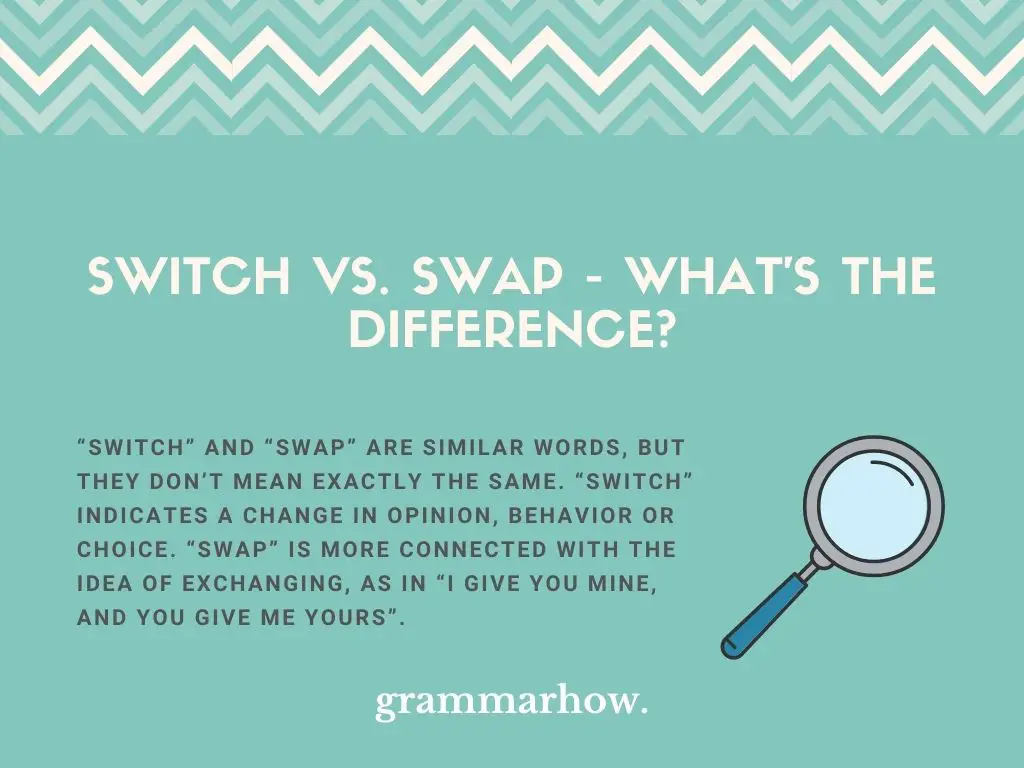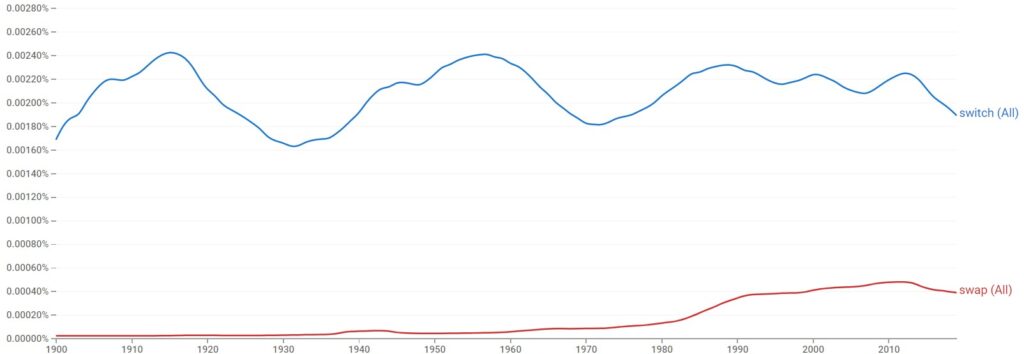“Switch” and “Swap” are often used interchangeably, as synonyms. However, do they really mean the same and can be used like that?
The reason to look into the meaning of words, is to understand the best way to use them, to send a clear message. We’ll do it right now.
Switch vs. Swap – What’s the Difference?
“Switch” and “Swap” are similar words, but they don’t mean exactly the same. “Switch” indicates a change in opinion, behavior or choice. “Swap” is more connected with the idea of exchanging, as in “I give you mine, and you give me yours”.

Take a look at some examples included below:
- It was impressive how fast Vanessa could switch between languages.
- Vanessa decided to swap her old phone in for a new one.
The sentences in the example tell us about Vanessa. In the first sentence, we learn that Vanessa speaks more than one language and can “Switch” between them easily. Obviously, Vanessa doesn’t let go or forgets a language when using the other. She just “flips a switch”.
Vanessa also had an old phone, which she decided to “Swap”. It means she let go of her old device and replaced it by a brand new one.
Switch
“Switch” indicates a sudden change, of one person or thing to another. The idea behind it is the one of “flipping a switch”, that turns something on and off: it’s not a progressive, subtle change. It’s more like a quick, unexpected, complete change.
Looking at the The Cambridge Dictionary, we find a similar definition. Let’s look at some examples of how to use “Switch” in a sentence:
- This browser is glitching, and I think I should switch over to another one.
- Jan, do you mind me switching you over to another department for the day?
- Kyle switched the light on.
- If you’re unhappy with your career, you should switch it.
- Is there any way to switch the game mode?
“Switch” indicates a change you can come back from, if you wish to. By “Switching” you aren’t giving away your previous choice – for example, if you “Switch” careers, you can alway go back to the old one, because you keep the skills and the experience.
Swap
“Swap” relates to the idea of giving something and receiving something in return. When you make a “Swap”, you let go of something you had before and replace it for something new that’s coming in.
According to The Cambridge Dictionary, to “Swap” is to exchange, which agrees with our definition presented here.
Take a look at the examples below:
- Do you mind swapping seats with me?
- You can always swap your old laptop in for an upgraded one.
- The kids decided to swap the toys they got for Christimas.
- Heather wished she could swap jobs with Derek.
- Brenda didn’t like her entree and asked Jordan to swap with her.
Unlike “Switch”, which allows you to keep both things, to “Swap” indicates trading one thing for the other. If, like in sentence 2, you “Swap” your laptop, you’ll give your old one up, in order to get a new one. You wouldn’t be able to go back to the old laptop if you wanted.
Which Is Used the Most?
In life, do you think people would “Switch” or “Swap” more often? And how does that reflect in how those words are used? We’ll take a look at a graph from Google Ngram Viewer to find out.

“Switch” seems to be used much more frequently than “Swap”. Maybe we expected the difference between them wasn’t so extensive, but at the same time, it makes sense “Switch” would be used more.
It’s in human nature the desire to accumulate things. The idea of trading things in, with the purpose of reusing them or recycling is fairly new. In that context, it makes sense that people would search to have options to “Switch”, without necessarily having to “Swap”.
Final Thoughts
Although “Switch” and “Swap” refer to change, they don’t mean the same thing. To “Switch” is to make a change, from one thing to the other, without necessarily letting go of the first. To “Swap” is to exchange, meaning something has to go for something new to replace it.

Martin holds a Master’s degree in Finance and International Business. He has six years of experience in professional communication with clients, executives, and colleagues. Furthermore, he has teaching experience from Aarhus University. Martin has been featured as an expert in communication and teaching on Forbes and Shopify. Read more about Martin here.
